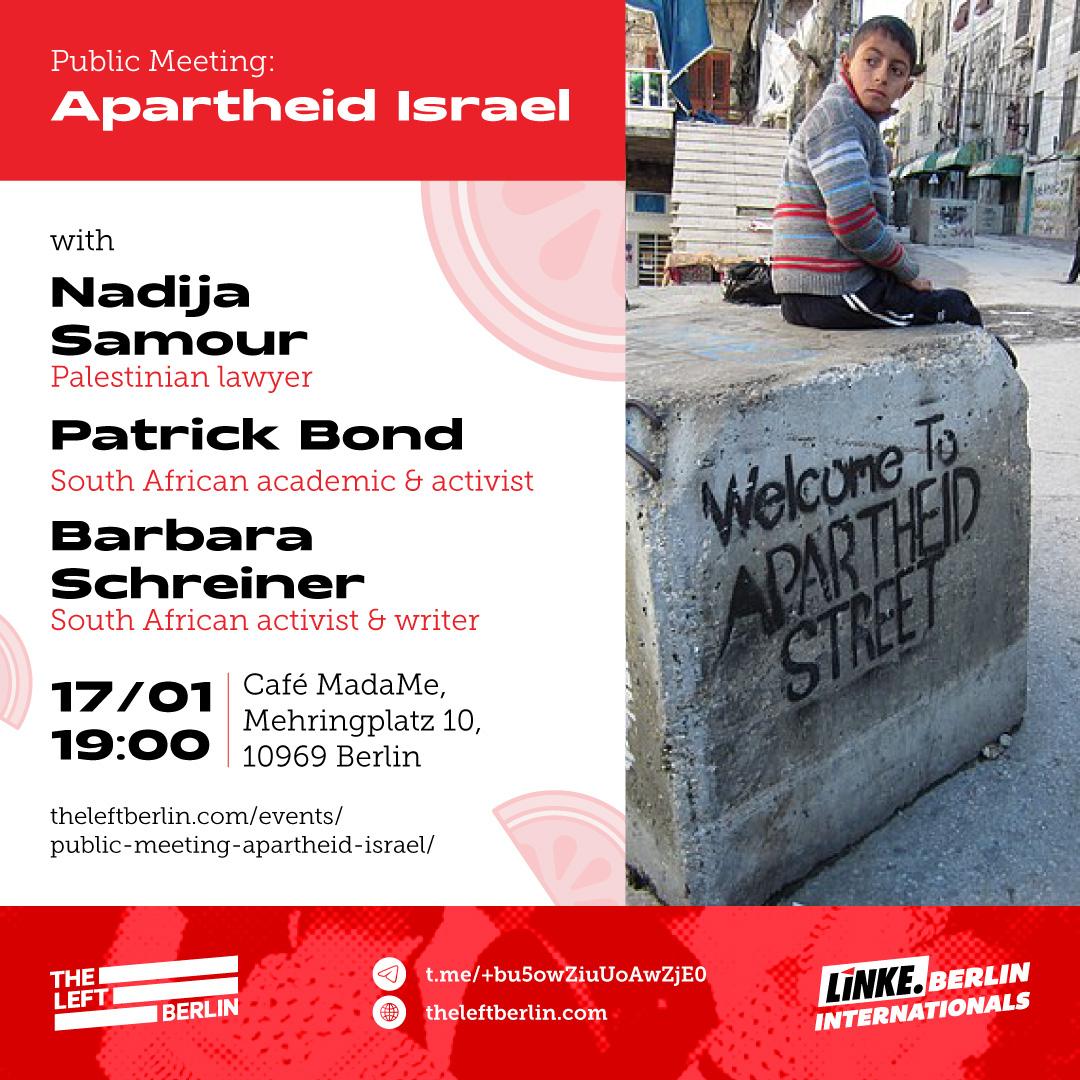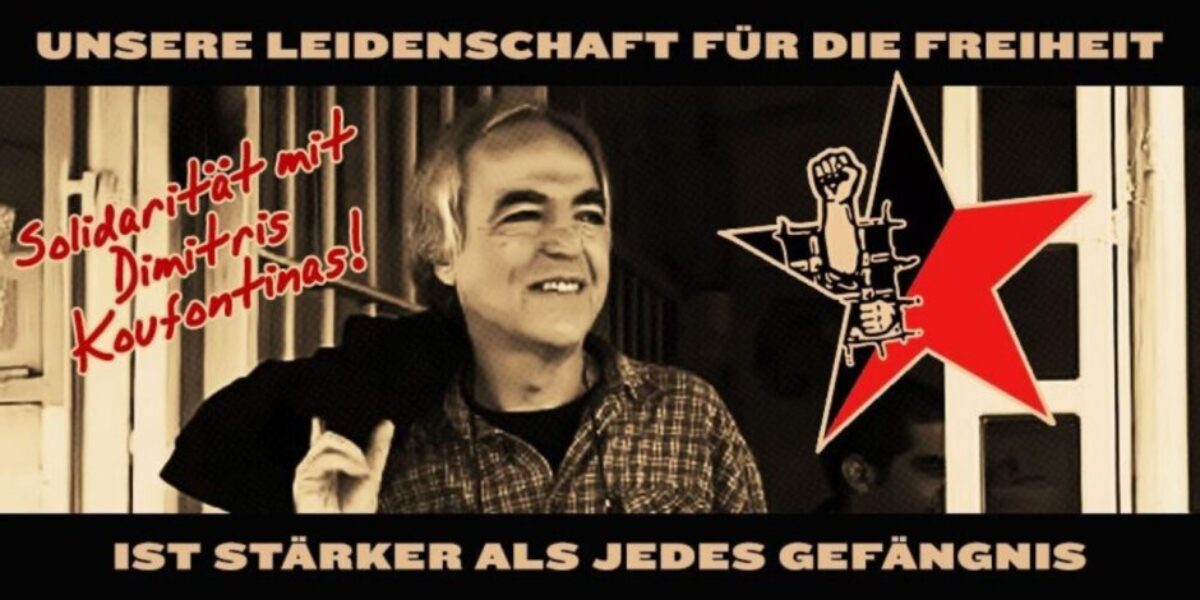
Mittwoch, 17.01.2024 | 19:00 Uhr | Cafè MadaMe Mehringplatz 10, 10969 Berlin
Anreise: U-Bhf Hallesches Tor U1, U3, U6, Bus 248, M41
📣 Aufruf: https://www.theleftberlin.com/events/public-meeting-apartheid-israel/
#b1701 #PalestineSolidarity
*** english below ***
mit Nadija Samour (palästinensische Anwältin), Patrick Bond (südafrikanischer Wissenschaftler und Aktivist) und Barbara Schreiner (südafrikanische Aktivistin und Geschäftsführerin des Water Integrity Network).
Ein Treffen von Aktivisten und Akademikern zur Diskussion und Analyse der israelischen Apartheid, mit besonderem Schwerpunkt auf Vergleichen mit Südafrika
Im Jahr 2022 bezeichnete Amnesty International Israel als Apartheidstaat. Andere Organisationen wie B’Tselem, Human Rights Watch und die südafrikanische Regierung haben denselben Vorwurf erhoben. B’Tselem argumentiert, dass Israel „die Vorherrschaft einer Gruppe – der Juden – über eine andere – die Palästinenser – vorantreibt und aufrechterhält“.
Andere argumentieren, dass Israel und das südafrikanische Apartheidsystem zwar beide rassistische Staaten seien, die bei der Entwicklung eines gemeinsamen Atomprogramms zusammenarbeiteten, es aber falsch sei, sie zu sehr zu vergleichen. So beruhte die südafrikanische Apartheid beispielsweise auf der Ausbeutung der schwarzen Arbeiter, während die Palästinenser systematisch von der israelischen Wirtschaft ausgeschlossen sind. Die derzeitige israelische Politik in Gaza zielt eher auf Vertreibung und Ausrottung als auf Rassentrennung ab.
Andere, wie der südafrikanische Künstler Adam Broomberg, gehen noch weiter und argumentieren: „Es ist nicht richtig, Israel mit Südafrika zu vergleichen. Was in Israel passiert, ist viel schlimmer„. Doch trotz der Unterschiede zwischen den beiden Systemen kann uns der Sturz der Apartheid in Südafrika dabei helfen, eine Strategie zu entwickeln, um dem israelischen Terror heute entgegenzutreten.
Professor Patrick Bond war aktiv am Kampf gegen die Apartheid in Südafrika beteiligt und hat die internationale BDS-Kampagne beraten, was sie vom Massenboykott der Apartheid in den 1970er und 1980er Jahren lernen kann. Patrick wird über die Ähnlichkeiten und Unterschiede zwischen dem heutigen Israel und dem damaligen Südafrika sprechen.
Nadija Samour ist eine in Berlin lebende palästinensische Anwältin, über die kürzlich ein Bericht auf Al-Jazeera erschienen ist. Sie wird die Diskussion auf den neuesten Stand bringen und darüber sprechen, wie die Dämonisierung und Trennung von Palästinensern in Israel und in Berlin funktioniert.
Wir freuen uns, eine zusätzliche Rednerin aus Südafrika ankündigen zu können: Barbara Schreiner, Geschäftsführerin des Water Integrity Network. Barbara hat kürzlich über ihren Besuch im besetzten Palästina berichtet.
Nach den Vorträgen von Patrick, Nadija und Barbara wird es ausreichend Zeit für Fragen und Beiträge geben.
Jeder, der sich für Gerechtigkeit in Palästina interessiert, ist eingeladen, sich an der Debatte zu beteiligen.
Die Veranstaltung wird hier als Livestream übertragen.
Public meeting: Apartheid Israel
Wednesday, 17.01.2024 | 07:00 pm | Cafè MadaMe Mehringplatz 10, 10969 Berlin
Arrival: U-Bhf Hallesches Tor U1, U3, U6, Bus 248, M41
📣 Call: https://www.theleftberlin.com/events/public-meeting-apartheid-israel/
#b1701 #PalestineSolidarity
with Nadija Samour (Palestinian lawyer), Patrick Bond (South African academic and activist) and Barbara Schreiner (South African activist and Executive Director of the Water Integrity Network).
A meeting for activists and academics to discuss and analyse Israeli apartheid, with particular focus on comparisons with South Africa
In 2022, Amnesty International called Israel an Apartheid state. Other organisations, like B’Tselem, Human Rights Watch and the South African government have made the same charge. B’Tselem argue that Israel “advanc[es] and perpetuat[es] the supremacy of one group – Jews – over another – Palestinians.”
Others argue that although Israel and Apartheid South Africa are both racist states, which collaborated in developing a joint nuclear programme, it is wrong to compare them too closely. For example, South African Apartheid depended on the exploitation of Black Labour, while Palestinians are systematically excluded from the Israeli economy. The current Israeli policy in Gaza is aimed more at expulsion and extermination than in racial separation.
Others, like South African artist Adam Broomberg, go further, arguing “It is inaccurate to compare Israel with South Africa. What’s going on in Israel is much worse”. And yet, despite the differences between the two systems, the overthrow of Apartheid in South Africa can help us develop a strategy for opposing Israeli terror today.
Professor Patrick Bond was an active participant in the fight against apartheid in South Africa, and advised the international BDS campaign on what they could learn from the mass boycott of Apartheid in the 1970s and 1980s. Patrick will be talking about the similarities and differences between Israel now and South Africa then.
Nadija Samour is a Palestinian lawyer based in Berlin, who was recently the subject of a profile on Al-Jazeera. She will bring the discussion up-to-date, and talk about how the demonisation and separation of Palestinians works in Israel, and in Berlin.
We are pleased to announce an extra speaker from South Africs Barbara Schreiner, Executive Director of the Water Integrity Network. Barbara recently reported on visiting Occupied Palestine.
After Patrick, Nadija and Barbara speak, there will be plenty of time for questions and contributions. Everyone who is interested in justice for Palestine is invited to join the debate.
The meeting will be livestreamed here.
